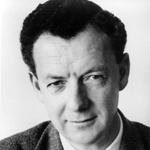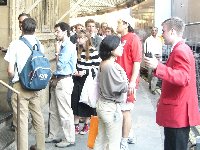Our weekly listen and look at living, breathing composers and performers that you may not know yet, but I know you should… And can, right here and now, since they’re nice enough to offer so much good listening online. (The “click picks” category at the bottom of this post isn’t working, but you can revisit all the previous “click picks” by clicking this link: https://www.sequenza21.com/index.php/?cat=29)
Soteria Bell (AU)
From Australia’s Time Off newspaper: If you’ve seen the latest Ray Lawrence flick Jindabyne, no doubt you’ve been entranced by the ethereal soundtrack. Written by Paul Kelly and Dan Luscombe, Kelly hand picked the Melbourne duo Soteria Bell, featuring Mia Shaw and Linda Laasi, to join him in creating the unnerving atmosphere the film’s score creates. “We had seen the film without music before the sessions began and in some cases Paul [Kelly] would remind us of a scene in the film, and then it was a matter of remembering that scene and trying to convey the emotion that was felt during it with our voices,” Mia Shaw says. “It was challenging, and a fantastic experience.” After collaborating on highly-acclaimed harmonic throat singer Dean Frenkel’s album Cosmosis, the duo are currently working on their debut 44 Sunsets, with first single ‘Dragma’ released soon. “The album is coming along really well,” she says. “We are working with great, creative people [and] we have a lot of special guests such as Frenkel on the album. “The album is varied, with an instrumental track, purely vocal layered tracks, and everything in between — we have had no boundaries for it! Also [we had] no real pre-conceived idea of what it should sound like. “It is definitely an exploration of the voice and what the voice is capable of, both organically and in some cases having been processed a little and played around with by our co-producer Simon Bailey.” And after the record is finished? “Once the album is done, we’ll be concentrating on live shows. How [we’ll] translate it all over from the studio to stage will be interesting, and we are very much looking forward to it!”
David Fenech (b. 1969 — FR) / Ghedalia Tazartes (b. 1947 — FR) / Frank Pahl (b. 1958 — US) / Julia Holter (US)
Somewhere in the nether region between pop/folk and classical/tech, flying well under most folks’ radar, a genre has quietly developed around the world. Its means are often low-tech and lo-fi, its sound like something born out of “the people”. But which “people” makes all the difference… This music isn’t the simple borrowing and mixing of this or that pop/art thread into the other; the imaginings of these folk take their work past the merely Synthetic, to a genuinely new Authentic. So, a music of “the people”, but a people that that these musicians’ own inner necessity had to invent. Naive, simple and direct… but really smart, complex, and purposely ambiguous. In that is every bit as much art as any with “classical” composer working today.
There are so many places I could point you to hear stuff from all over, both pioneers and fresh faces. But screw the history lesson; just listen to a couple of my own faves to get the idea.
And what better place to start than with David Fenech and his Demosaurus website? I can give you three artists to hear, each born in a different decade, all gathered in one place. I’ll let David introduce himself:
“David Fenech has been an active composer, performer, and improviser for over ten years in France. His works include acoustic, electronic, tape, and digital media, including sound installations and film scores. After creating the musical collective peu importe in Grenoble in 1991 (free improvisation and songs – many gigs in Europe) his music has shifted to more personal and strange areas, mainly using voice as an instrument. In 2000 he released his first solo CD, called Grand Huit. As a soloist, David plays guitar and ukulele as well as small instruments such as melodica, cavaquinho, toy piano and xylophone. He recorded concrete music at la Muse en Circuit with Laurent Sellier, at the Coream studio with Claude Hermitte. He also wrote the score for Tant de chiens, a short movie by Stephane Ricard; they then worked together on an interactive installation called Eloise, based on the idea of a musical tamagotchi.”
From the Forced Exposure website: Ghedalia Tazartes is a nomad. He wanders through music from chant to rhythm, from one voice to another. He paves the way for the electric and the vocal paths, between the muezzin psalmody and the screaming of a rocker. He traces vague landscapes where the mitre of the white clown, the plumes of the sorcerer, the helmet of a cop and Parisian anhydride collide into polyphonic ceremonies…. The greatest trips are made in the deep end of the throat: the extra-European music opens the ear to Ghedalia’s intra-European exoticism. Where was music before music halls? Where was the voice before it learned how to speak? Ghedalia is the orchestra and a pop group all in one person…. The author and his doubles work without a net, freely connecting the sounds, the rhythms, his voice, his voices.
And back to David: “Frank Pahl is a fantastic musician…. a one man band, also known as a member of Only a Mother, playing a raw music on acoustic instruments (we can hear ukuleles, prepared piano, clarinets, euphonium). Beautiful melodies seem to come out from nowhere…. the unknown world of inventive folklore. With Brian Poole (Renaldo and the Loaf), Dennis Palmer (Shaking Ray Levi), Nick Didkovsky (Dr. Nerve , Fred Frith guitar quartet), Doug Gourlay, Tim Holmes and Eugene Chadbourne.”
About Julia Holter, I can tell you almost nothing, except: She’s pretty young, studies music (first in Michigan, now in California), has a penchant for giving small intimate concerts in her own home and likes to collaborate in all kinds of settings. Her open ears let all kinds of influences freely mingle, which are then shaped into wonderfully sensitive, naive-yet-waaay-smart miniatures. She doesn’t have an official website, only her Myspace page, and it only allows four tracks at any moment. But Julia changes the four out regularly, so drop by now and then to see what new treat has shown up. (I have ten great tracks now; be the first on *your* block to collect them all!)

 There are three anniversaries today of important events connected by a fascinating thread. November 22nd is remembered by many for the assassination of
There are three anniversaries today of important events connected by a fascinating thread. November 22nd is remembered by many for the assassination of 


 ‘If you’re talking about “relevance to the wider culture” and “speaking to our times“, and all that Greg Sandowian stuff, I couldn’t possibly care less … People seem to forget that there’s always going an audience for whom Beethoven’s 5th or La Boheme is a brand new experience’ – writes Henry Holland today in
‘If you’re talking about “relevance to the wider culture” and “speaking to our times“, and all that Greg Sandowian stuff, I couldn’t possibly care less … People seem to forget that there’s always going an audience for whom Beethoven’s 5th or La Boheme is a brand new experience’ – writes Henry Holland today in 